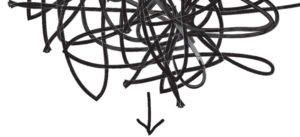Editor’s Note: I am reprinting* this post, by permission of its author, Greg McKeown, best-selling author, public speaker and founder and CEO of McKeown, Inc., a leadership and strategy design agency based in California. I met Greg many years ago at a talk he gave to the members of the local chapter of the National Association of Productivity and Organizing Professionals. I have been following his writing, podcasts and talks about “Essentialism” ever since. You can learn more about Greg’s work or subscribe to his newsletter at https://gregmckeown.com/
Have you ever continued to invest time and energy into a failing project instead of cutting your losses?
We all find it difficult to uncommit from nonessential projects and distractions – even if it’s a losing proposition.
But why?
One reason is that we tend to overvalue things that belong to us.
I’m sure you can think of things in your life that seem to be more valuable the moment you think about giving them away.
Psychologists call this the endowment effect. And unfortunately, it applies to our activities and commitments as well (that project at work or the hobby you’ve invested in but are only sort of enjoy).
Working hand-in-hand with the endowment effect is something called loss aversion.
This is the idea that we perceive the pain of losing something as more significant than the joy of gaining something else (1).
Loss aversion makes us afraid to uncommit because we fear losing an opportunity, a relationship, or prestige. Left unchecked, this fear of loss can blind us to what we can gain by exploring new and better opportunities.
But despite its difficulty, we can overcome the endowment effect and loss aversion.
A 1-Minute Strategy to Help You Uncommit
I’ve used this simple strategy, suggested by the BBC’s Tom Stafford, to evaluate how much I really value something.
- Pretend you don’t own it.
- Instead of asking how much you value something, ask, “How much would I pay to obtain this?”
- When it comes to non material things, ask, “How hard would I work to get involved if I wasn’t already involved?” (2).
*published by permission of Greg McKeown
(2) https://www.bbc.com/


